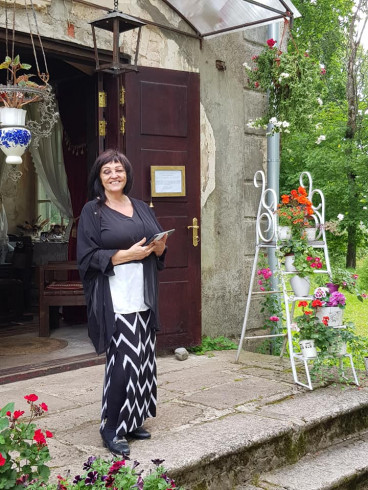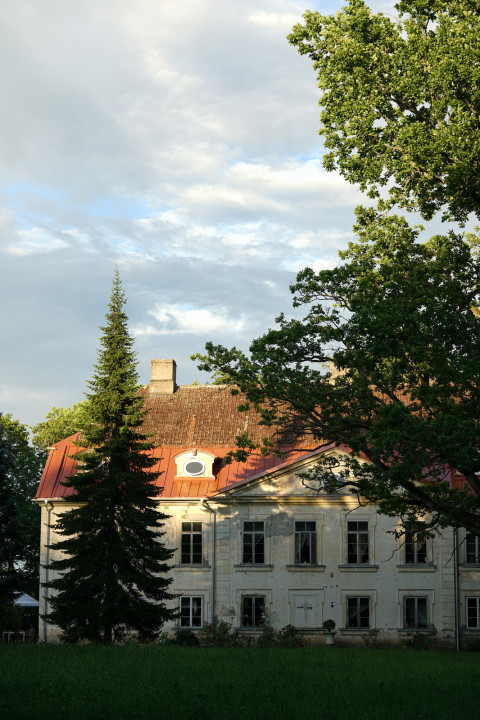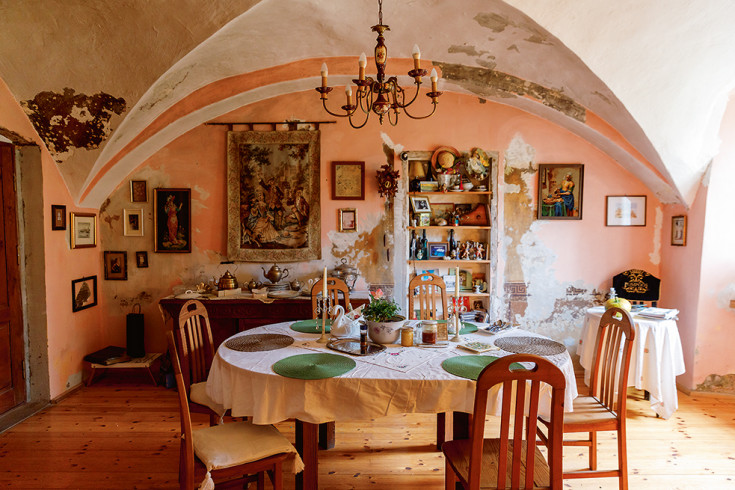While every child dreams about what he or she will be when they grow up, few of us actually wind up as astronauts or firemen. But Dita Balčus has been doubly fortunate, eventually becoming both an actress and a princess.
Dita’s first wish came true via a theatrical career in Rīga. And back in 2003, when she became the mistress of a rundown old Ziemeri Manor near Alūksne, 190 kilometres northeast of Riga, she followed in the footsteps of bluebloods from centuries past.

Mind you, the relationship has been more about financial headaches and gritty DIY than crowns and carriages. But Dita wouldn’t think of swapping Ziemeri for Buckingham Palace.
“The manor is both a lot of work and a great pleasure both for us and the many people who come here,” she says. “And that gives us the strength to continue.”
Over the centuries, Ziemeri Manor has offered hospitality to many colourful characters.
The story begins in chronicles from 1550, when Johann Felberg sold it for 100 dalders to his brother-in-law Albrecht Seimer. After being gutted by fire during the plague of 1710-1711, it was rebuilt in the classical form it retains to this day.
As it sat astride the highway linking Riga and St. Petersburg, Alūksne’s most famous citizens – Ernst Glick, a local pastor who made the first translation of the Bible into Latvian, and his illiterate peasant stepdaughter Marta Skavronska, whose astonishing life culminated in her becoming Czarina Catherine I of Russia – could well have stopped over.
And Marta’s husband, Czar Peter the Great, who frequently journeyed along that route, may have spent the night too.
In the 19th century, Ziemeri was acquired by the barons von Wolf, adding to their 90 other estates in Latvia and Estonia. The old feudal order came to an abrupt end in the 20th century. In 1935, Latvian banker Teodors Plūme bought the place as a gift for his daughter Elvīra, only to have it nationalised by the Soviet regime, who installed a library, a dairy, a cinema and numerous cramped apartments.
Into this melange of history stepped Dita. A self-confessed city slicker, she felt the quintessential Latvian urge to get away from the big smoke and was immediately charmed by Ziemeri. The location, just a few kilometres from the border with Estonia and Russia, gave the place an alluringly remote feeling. And charmed by the oak trees planted by the first Baron von Wolf to celebrate the birth of his sons, she felt drawn to give this heritage a new lease on life.
Despite what her generation had been taught in Soviet history lessons, the old aristocrats weren’t “bloodsuckers.”
“Two hundred years ago, people lived their lives, thought their thoughts and loved each other here,” she says. “And I felt a bit of that in the atmosphere – so much love.”
Realising that the place needed more attention than just a weekend here and there, Dita and daughters Elizabete, Egija and Kristiāna moved to Ziemeri permanently. The early years were anything but posh, complete with a leaking roof, no indoor plumbing and mattresses for beds. But they have gradually stripped away the Soviet-era dividing walls, restored original details like the baronial fireplace, and added their own eclectic interior design to create an inspiring-yet-cosy space.
Atmosphere in abundance
Evoking atmosphere is something the family excels at. For 20 years, Dita has run a small private theatre in Old Riga, while Egija is an actress and Elizabete is a musician. And then there are performers from another realm… More than one guest has encountered ghosts, and a group of visiting clergymen swore they saw the furniture moving one night. According to Dita, after they paraded around the manor sprinkling holy water, the shadowy hosts have been less disruptive.

All of this makes for a hotel experience out of the ordinary. You can find them on Airbnb under the name “4 Roses & Wolf.” The said roses are obviously the ladies. Wolf is their grey cat, whose demeanour is nothing less than royal.
The dames acquired Ziemeri for just 40,000 lats (68,000 euros), about the price of a one-Riga apartment in the early 2000s. But inevitably, the renovation bill skyrocketed, and they are still paying off a mortgage on their Riga apartment to fund the dream.
The Covid era has brought more financial worries, as Dita’s Riga theatre, like most cultural institutions, has been shut since spring 2020. But for Dita, money is “just pieces of paper,” and she wants to harness the zeitgeist for new creative endeavours.
During the pandemic lockdowns, middle-class urban dwellers are spending more and more time at their country retreats. And Dita thinks this will be a permanent shift.
“With the closure of the theatres, concert halls, galleries and clubs, Riga is a spent force,” she believes. “Now people have time to reflect on life, and they realise it will never be the same as it was before Covid.”
So, the plan is to establish a theatre and cultural hub at Ziemeri to cater to this new clientele. Work has begun on turning the second floor of the manor, which used to be the ballroom and dining room in the baronial era, into a performance and exhibition space and a cafe
In the meantime, the guesthouse is doing good business. The rules presently allow members of a single household to stay at hotels, and with other travel opportunities blocked, Latvian families are exploring their homeland. And even on the chilliest winter days, they are guaranteed a warm welcome at Ziemeri.
“Relationships are the most important thing, and if we click, we enrich each other,” she says. “Through conversations and performances, our clients become our friends.”
This feature was originally published on the website of the Latvian Institute and is reproduced here with permission.


































